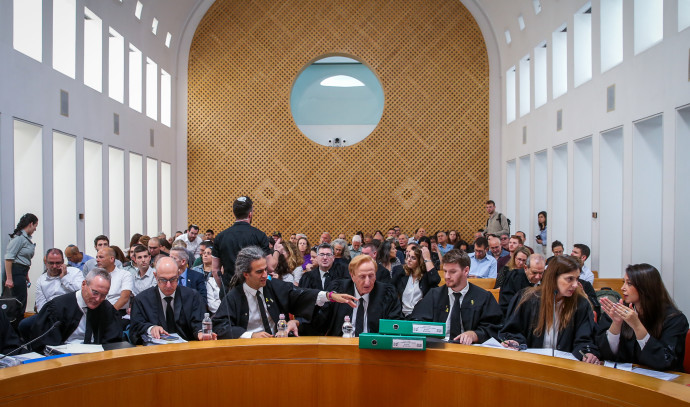Israel’s High Court of Justice began on Sunday morning a hearing on the contentious issue of the long-standing exemption of ultra-Orthodox men from IDF service. The hearing could lead the court to give a final order to the state to begin drafting haredi men, which could have dramatic social and political ramifications.
The two issues at the heart of the hearing
The hearing centered on two issues: First, whether or not the government could continue to avoid recruiting haredi men into the IDF, and second, whether or not the government could continue providing funding for haredi yeshivot for students of military age who no longer had a legal exemption from IDF service.
These two issues were first heard on March 28. Following that hearing, the High Court ruled that the government must begin drafting haredi men and that it could no longer provide funding for haredi students whose exemption had expired. However, this ruling was temporary, and the question at the heart of the hearing on Sunday was whether to turn this temporary order into a permanent one.
Adv. Doron Taubman, who represented the government, argued that the government did not dispute the fact that it was legally required to draft haredi men, and to refrain from doing so was illegal. However, the defense ministry had the prerogative to decide when and how to enlist these haredi men into the IDF, and that the court should not intervene.
On the issue of funding, Taubman agreed that yeshivot should not receive funding for haredi men who ignored draft orders. However, even though the law exempting haredi men expired, they had not actually been summoned yet, and therefore were not violating any draft orders. The government could thus continue issuing the funding, Taubman argued.
The hearing was held in a packed courtroom, and in front of an enlarged bench comprising nine justices. Some of the exchanges between the attorneys and the judges were heated, and at a certain point Likud MK Tally Gotliv, who sat in on the hearing but was not a side to it, attempted to interrupt the judges and make an argument. Some statements by Taubman were met with incredulous laughter from the crowd.
The case was heard by an extended nine-member bench led by Interim Chief Justice Uzi Fogelman. The judges constantly interrupted Taubman with a number of questions. On the issue of the general exemption, the judges pressed Taubman on whether the defense ministry could continue delaying the exemption indefinitely. The Attorney General’s Office wrote in a submission to the court on Thursday that the IDF was prepared to draft 3,000 haredi men into the IDF until the end of 2024, and the judges pressed Taubman on whether, for example, the defense ministry had the legal prerogative to refrain from doing so.
Israel’s Supreme Court ruled in the famous “Rubinstein principle” in 1998 that the government did not have the authority to exempt an entire group from service in the IDF, as this amounted to discrimination. A number of laws have been proposed since then to regulate the issue. The most recent law, which granted haredi men the ability to delay their service annually until receiving a final exemption at age 26, expired on July 1, 2023. The government, on June 25, decided to give itself until April 1, 2024, to come up with a new law. With this decision having expired, there is no longer a legal basis for the exemption.
The hearing also touched on the government’s controversial judicial reforms, which it attempted to promote in 2023. Deputy Attorney General Aner Hellman argued during the hearing that the government’s conduct during the case served the same purpose as the judicial reforms – to relieve itself of the duty to adhere to the attorney general’s interpretation of the law. On at least two occasions in proceedings relating to the case, the government approved proposals that the AG deemed unlawful.
Ultra-Orthodox Jews protest the High Court hearing on IDF conscriptions near Bnei Brak on June 2, 2024 (ISRAEL POLICE)
Later on Sunday, haredi men began demonstrating outside the High Court in Jerusalem and on Highway 4, near the ultra-Orthodox city of Bnei Brak, in protests of the court hearing.
Israel Police used water cannons and other means to control the protesting crowds.







